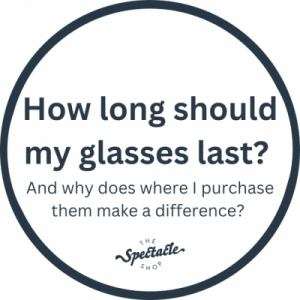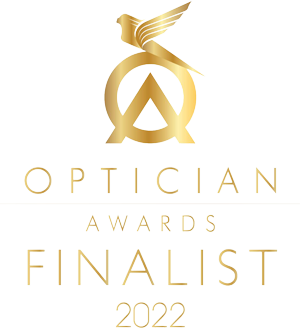How Long Should My Glasses Last And Why Does Where I Purchase Them Make A Difference?
By Lucy South FBDO
It’s no secret that in the current climate of rising bills and the rebellion against ‘fast fashion’, we want the purchases we make to last, eyewear included. It’s better for the environment and better for our bank accounts.
Some opticians often face customers who are having to replace their glasses sooner than intended. So why is this and how can it be avoided?
Understanding the Differences between Optical Chains and Independent Opticians
And how can paying a little more in the first place save you a lot in the future? Firstly, it is important to look at the different types of optical practices; optical chains/supermarket opticians and independent opticians. Optical chains and supermarket opticians are responsible for around 95% of eyewear sales in the UK. These companies often follow a business model designed around seeing a high number of customers in a short time frame and rely on customers replacing their eyewear every time they have an eye exam. With optical chains and supermarkets, you might find it more expensive to have a reglaze on a frame you already own as the company benefits more if you purchase a new pair. Here, frames of a genuine high-quality are few and far between as they are typically manufactured using materials designed to only last a few years. Frame repairs are limited as they can be time consuming and delay further sales, therefore customers are often incorrectly advised that the frame cannot be repaired when in fact, with the correct tools and time, the repair is straight forward.
The Benefits of Choosing an Independent Optician: Personalised Care and Expertise
Independent opticians are typically owned by optometrists or dispensing opticians who are passionate about customer service and eyewear. The time spent to perform an eye exam, along with the time spent choosing glasses, tends to be greater than that of optical chains and supermarket opticians. In an independent optical practice the product range is vast and often without limitation, with thought and time spent choosing the collections and frame ranges that are stocked. Whilst some independent opticians do choose to stock a mixture of high-end and low-end stock, some focus on just one area: high-end. These luxury independent opticians only offer premium and luxury products. These collections are often hand-crafted by artisans using the very best materials.
Built to Last?
Different glasses are built to last different amounts of time. If we look at, for example, a £30 budget frame which includes free lenses and is mass-produced using cheap materials should we really expect it to last more than a year? Would we expect to buy a pair of shoes for £30 and wear them every day for 12 months and not expect obvious signs of wear and worn-down soles? Probably not. But you would expect a pair of £300 shoes to last a good few years. Maybe they would need resoling after some time, and a good polish now and then, but with the appropriate maintenance they will last a long time. The same applies to eyewear.
Frame Materials Matter
We’ve all heard the saying “you get what you pay for” and this can ring true with eyewear. One tip is to not get drawn in by designer labels as most of the time, glasses with a designer badge or logo on the side tend to be mass produced by one of a few companies who do not focus on quality but still charge a premium for the designer name.
Instead, research eyewear manufactures who create frames using high-quality materials such as Mazzuchelli acetate or surgical-grade titanium. Avoid frames with heat-sunk joints, instead opt for frames finished with pinned hinges. A frame created using high quality acetate can be polished if scratched or tarnished just as pinned hinges can be re-pinned if snapped. A cheaper acetate will become brittle and weak over time leading to breakage, and low-quality hinges and joints will easily distort and snap. Low-quality hinges and scharniers will also wear quickly, losing their ability to be tightened. Frames made from titanium are lightweight, flexible, hypoallergenic, and non-corrosive, and will withstand adjustments and reglazes for years to come. Nickel frames will discolour and quickly send nose-pads green, something that does not occur often with titanium frames.
Always research the frame collection before purchasing, don’t just assume that because a frame is the most expensive in the shop that it is high-quality and built to last.
Luxury Lenses
When it comes to lenses there is also a huge difference between the high-end and low-end of the market. Some lenses sold by optical chains and supermarkets originally came to market over 20 years ago. Would we buy a computer or phone that came to market over 20 years ago, even if it was still brand new? Probably not, as the technology would be so outdated to suit our modern lifestyles -think smart phones, laptops, car infotainment screens, the list goes on. The same applies for Lenses. Lenses at the high-end of the market, sold by luxury independent opticians, are designed by award winning companies who utilise the latest technology to manufacture bespoke lenses for the individual. These lenses take into consideration the wearers unique measurements as well as their lifestyle. Lens coatings, again, differ greatly with low-quality anti-reflective coatings appearing to smear and easily becoming corroded compared to high-quality anti-reflective coatings which also have anti-scratch, dirt repellent, water-repellent, and anti-static qualities, along with guarantees to replace lenses if scratched.
How Much Should I Spend?
This is not to say that budget glasses don’t have a place. If you are looking for a spare pair for gardening, decorating, or anything else where the frame and lenses could easily damage perhaps a £30 pair from an optical chain/supermarket, or in some instances the internet, would be more ideal. But if you are looking for a frame that will still look good in years to come, thorough research into the optical practice and eyewear collection is a must.
Make sure you are using the right opticians for you and your individual needs.
Article by Lucy South FBDO



